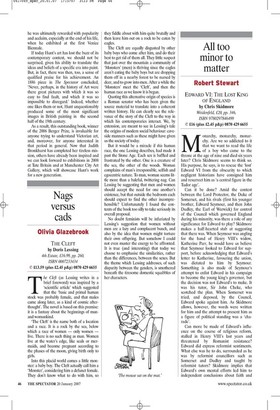Nags versus cads
Olivia Glazebrook THE CLEFT by Doris Lessing 4th Estate, £16.99, pp. 260, ISBN 0007233434 £13.59 (plus £2.45 p&p) 0870 429 6655 The Cleft (as Lessing writes in a brief foreword) was inspired by a 'scientific article' which suggested that the 'basic and primal human stock was probably female, and that males came along later, as a kind of cosmic afterthought'. The novel is based on this premise: it is a fantasy about the beginnings of manand womankind.
'The Cleft' is the name both of a location and a race. It is a rock by the sea, below which a race of women — only women — live. There is no such thing as man. Women live at the water's edge, like seals or mermaids, and become pregnant according to the phases of the moon, giving birth only to girls.
Into this placid world comes a little monster: a baby boy. The Cleft actually call him a 'Monster', considering him a defunct female. They don't know what to do with him, so they fiddle about with him quite brutally and then leave him out on a rock to be eaten by eagles.
The Cleft are equally disgusted by other baby boys who come after him, and do their best to get rid of them all. They little suspect that just over the mountain a community of 'Monsters' (men) is thriving since the eagles aren't eating the baby boys but are dropping them off in a nearby forest to be nursed by deer, and to grow into men. After a while the 'Monsters' meet the 'Cleft', and then the human race as we know it is begun.
Quoting this alternative origin of species is a Roman senator who has been given the source material to translate into a coherent written history. He can clearly see the relevance of the story of the Cleft to the way in which his contemporaries interact. We, by extension, are meant to see in Lessing's tale the origins of modern social behaviour: caveside manners such as these might have given us the society of today.
But it would be a miracle if this human race, the one Lessing describes, had made it past the Stone Age. Each sex is baffled and frustrated by the other. One is a creature of the sea, the other of the woods. Woman complains of man's irresponsible, selfish and egocentric nature. To man, woman seems little more than a baleful, twittering nag. Can Lessing be suggesting that men and women should accept the need for one another's existence, but that outside the bedroom each should expect to find the other incomprehensible? Unfortunately I found the contents of the book too silly to take seriously its overall proposal.
No doubt feminists will be infuriated by Lessing's suggestion that women without men are a lazy and complacent bunch, and also by the idea that women might torture their own offspring. But somehow I could not even muster the energy to be affronted. It is true (and interesting) that today we choose to emphasise the similarities, rather than the differences, between the sexes. But the theme which Lessing addresses, of such disparity between the genders, is smothered beneath the tiresome domestic squabbles of her characters.





















































 Previous page
Previous page